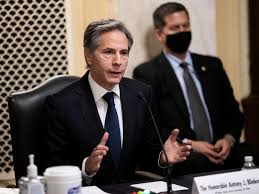The United States has introduced visa restrictions on Cameroonians “undermining the peaceful resolution of the crisis in Anglophone regions of Cameroon.”
In a statement made public Monday, June 7, 2021, US Secretary of State Antony Blinken says the visa restrictions on those against a peaceful resolution of the Anglophone crisis reflect the commitment of the United States to advance dialogue as a peaceful tool towards a resolution of the crisis.
“I am establishing a policy imposing visa restrictions on individuals who are believed to be responsible for, or complicit in, undermining the peaceful resolution of the crisis in the Anglophone regions of Cameroon,” US Secretary of State Antony Blinken said in a statement.
“United States is committed to ending the continuing violence in Cameroon and to supporting the Cameroonian people. Starting today, we are imposing visa restrictions on those involved in undermining peace in the Anglophone regions of Cameroon,” added Blinken.
Blinken said the decision “reflects our commitment to advance a dialogue to peacefully resolve the Anglophone crisis and support respect for human rights,” adding that the United States “strongly supports the Cameroonian people, and we remain committed to working together to advance democracy and mutual prosperity for both our countries.”
“The United States is deeply concerned by the continued violence in the Anglophone regions of Cameroon. We continue to call for both the Cameroonian government and separatist armed groups to end the violence and engage in a dialogue without preconditions to peacefully resolve the crisis,” Blinken said.
“It is important that children can attend school and that humanitarian aid can be delivered. We urge all relevant stakeholders in Cameroon and in the diaspora to engage constructively and seek a peaceful resolution to the crisis.“
He added that the United States condemns those “who undermine peace through engaging in or inciting violence, human rights violations and abuses, and threats against advocates for peace or humanitarian workers.”
Cameroon’s two western Anglophone regions have been gripped by fighting since 2017 as the rebels try to break away from the predominantly Francophone government. More than 3,500 people have died and 700,000 have been displaced in the violence. Cameroon’s state forces have been battling to dislodge armed separatists who pitched their tents in the North West and South West Regions since Anglophone protests transformed into an armed conflict in 2017.
Corporate demands by Common Law Lawyers and Anglophone Teachers led to protests in November 2016. The street demonstrations later morphed into ongoing running gun battles between state forces and armed separatist fighters in the predominantly English-speaking regions, leading to untold destruction of human lives, their habitats, and livelihoods.
Tit-for-tat killings, kidnappings, arsons, maiming, and outright terror have become part of daily lives in some parts of the English-speaking regions. Members of the Cameroonian diaspora are directing the separatist movement, with most of the ringleaders living in the United States.

